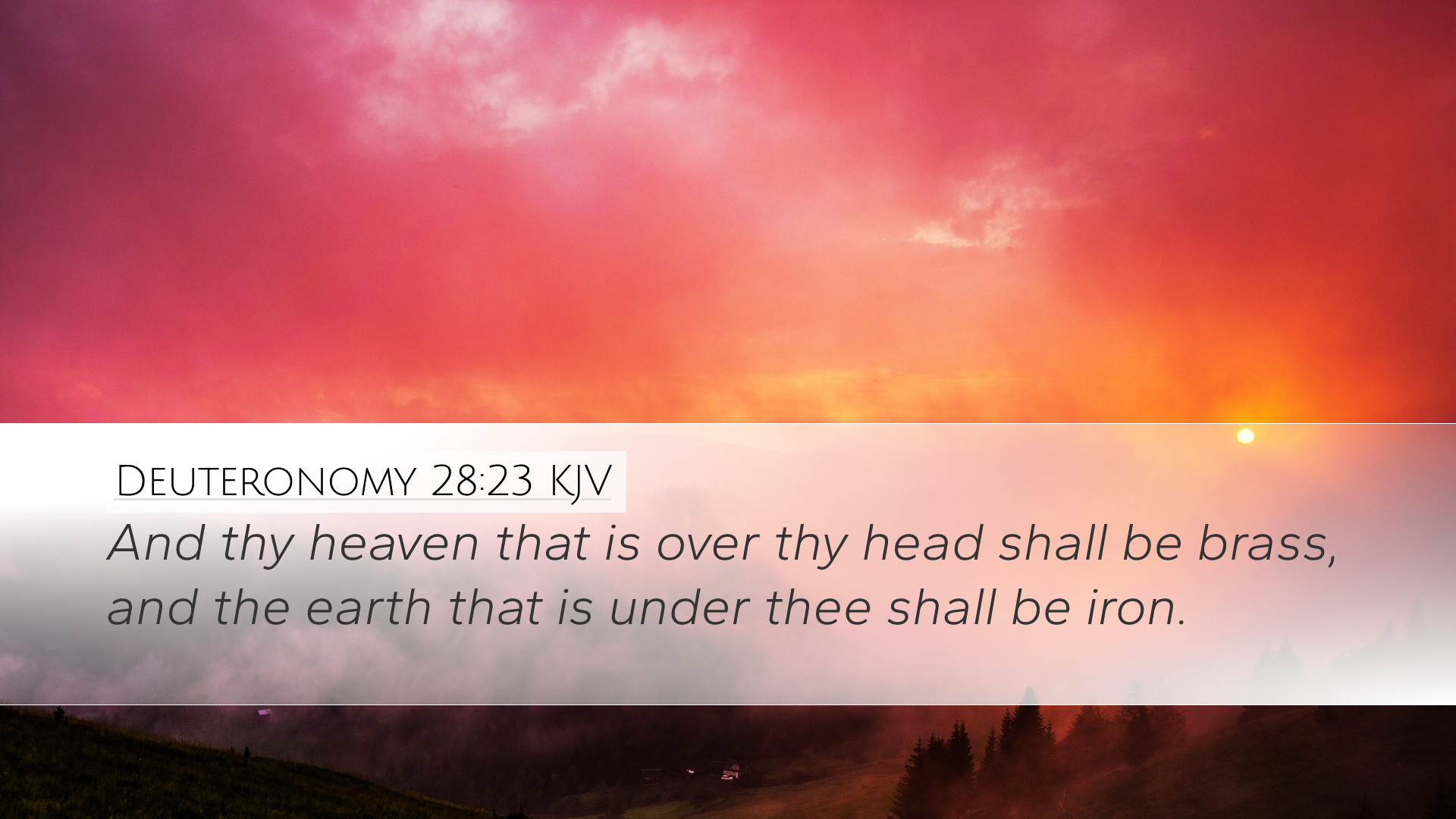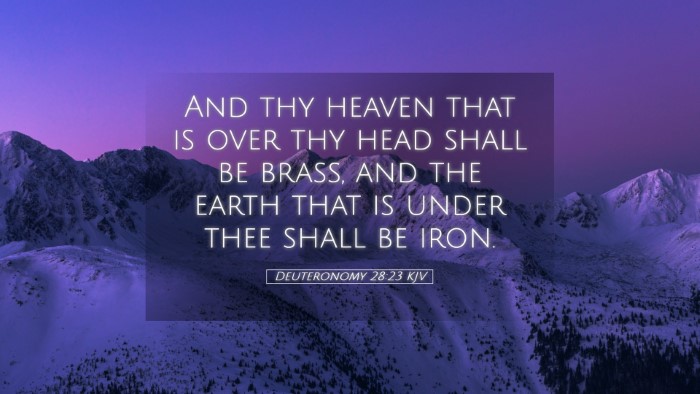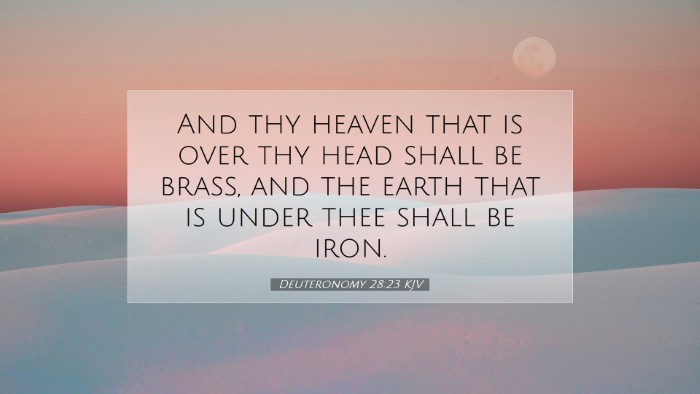Commentary on Deuteronomy 28:23
Bible Verse: "And thy heaven that is over thy head shall be brass, and the earth that is under thee shall be iron."
Introduction
Deuteronomy 28 represents a pivotal chapter in the book of Deuteronomy, often referred to as the chapter of blessings and curses. In this context, verse 23 serves as part of the pronounced curses upon the people of Israel if they fail to adhere to the commandments of God. The imagery used here requires in-depth exploration for proper theological understanding and implications for the faithful. This summary combines insights from several public domain commentaries, including Matthew Henry, Albert Barnes, and Adam Clarke.
Context and Meaning
This verse encapsulates profound themes of divine judgment and societal consequences. In studying this verse, we recognize the original intent of these blessings and curses—as a means to encourage obedience. The latter part of chapter 28 outlines consequences that ensue from disobedience, with heaven described as "brass" and earth as "iron," implying a harsh and unyielding reality for those disconnected from God’s favor.
Heaven as Brass
Matthew Henry's Commentary: Henry remarks that 'heaven being brass' signifies that prayers will not ascend as they should. The brass metaphor indicates a stone-like hardness and reflects the heavens’ closure against the cries of the people. The imagery suggests that their efforts to seek God’s favor will be futile if they deviate from His commandments.
Albert Barnes' Notes: Barnes elaborates on the metaphor's implications regarding the climate and agricultural productivity. A sky of brass denotes drought, signifying that God withholds rain—a vital source of sustenance for an agrarian society. The term suggests a barrier to grace and provision, emphasizing that divine blessing directly correlates with obedience.
The Earth as Iron
Adam Clarke's Commentary: Clarke expounds on the earth being likened to iron, indicating hardness and sterility. Iron symbolizes unfruitfulness where crops do not yield. This representation emphasizes that the earth will not provide its abundance as a result of disobedience, reinforcing the connection between the spiritual state of the people and their physical conditions.
Matthew Henry: He further underscores the seriousness of this figurative language, pointing out that it indicates a total lack of spiritual vitality and physical blessing. Without God’s favor, the earth becomes a desolate landscape, void of the life-giving properties it ordinarily possesses.
Theological Implications
From these reflections, we derive crucial theological insights pertaining to God’s character and the dynamics of covenant. The democracy of God's blessings is contingent upon man's faithfulness. This principle is a reminder to pastors and theologians of the covenantal nature of God's relationship with His people—obedience brings blessing, while disobedience invites curse.
- Covenantal Faithfulness: The verse reiterates the importance of living in alignment with God's commands. The chosen people, Israel, are called to obey, and their success or failure hinges upon this principle.
- The Reality of Judgment: The depiction of heaven as brass and earth as iron symbolizes the earnest seriousness of divine judgment. A moral and spiritual failure results in tangible consequences that affect all aspects of life.
- Persistent Prayer and Intercession: Pastors and students of theology may derive insights for developing a culture of persistent prayer. Just as the heavens turning to brass implies no answers, society must learn to cry out for renewed engagement with God to avoid such desolation.
Practical Application
The realities portrayed in Deuteronomy 28:23 extend beyond mere ancient context, serving as exhortation for today's believers. The nuances of divine judgment starkly remind contemporary Christians of their responsibility to uphold a life of obedience.
- Self-Examination: It is essential for believers to engage in self-examination concerning their obedience to God’s Word. Deuteronomy 28 calls for reflection on personal and corporate behaviors and the implications thereof.
- Communal Responsibility: The outcomes here are not solely individual; they can affect the entire community. Pastors should equip congregations with the understanding that collective obedience or disobedience influences broader societal conditions.
- Reconciliation and Restoration: Understanding the fullness of God’s character also guides believers toward repentance. Just as challenges arise from disobedience, drawing near to God brings restoration and reconciliation.
Conclusion
Deuteronomy 28:23 serves as a sobering reminder of the relationship between divine favor and human conduct. By synthesizing the interpretations of Matthew Henry, Albert Barnes, and Adam Clarke, we are led to appreciate the richness of this passage as it speaks vividly to modern-day implications. May this examination encourage those who study the Word to lead lives marked by obedience, fostering a deeper connection with our Creator and ensuring a flourishing community under His blessings.


